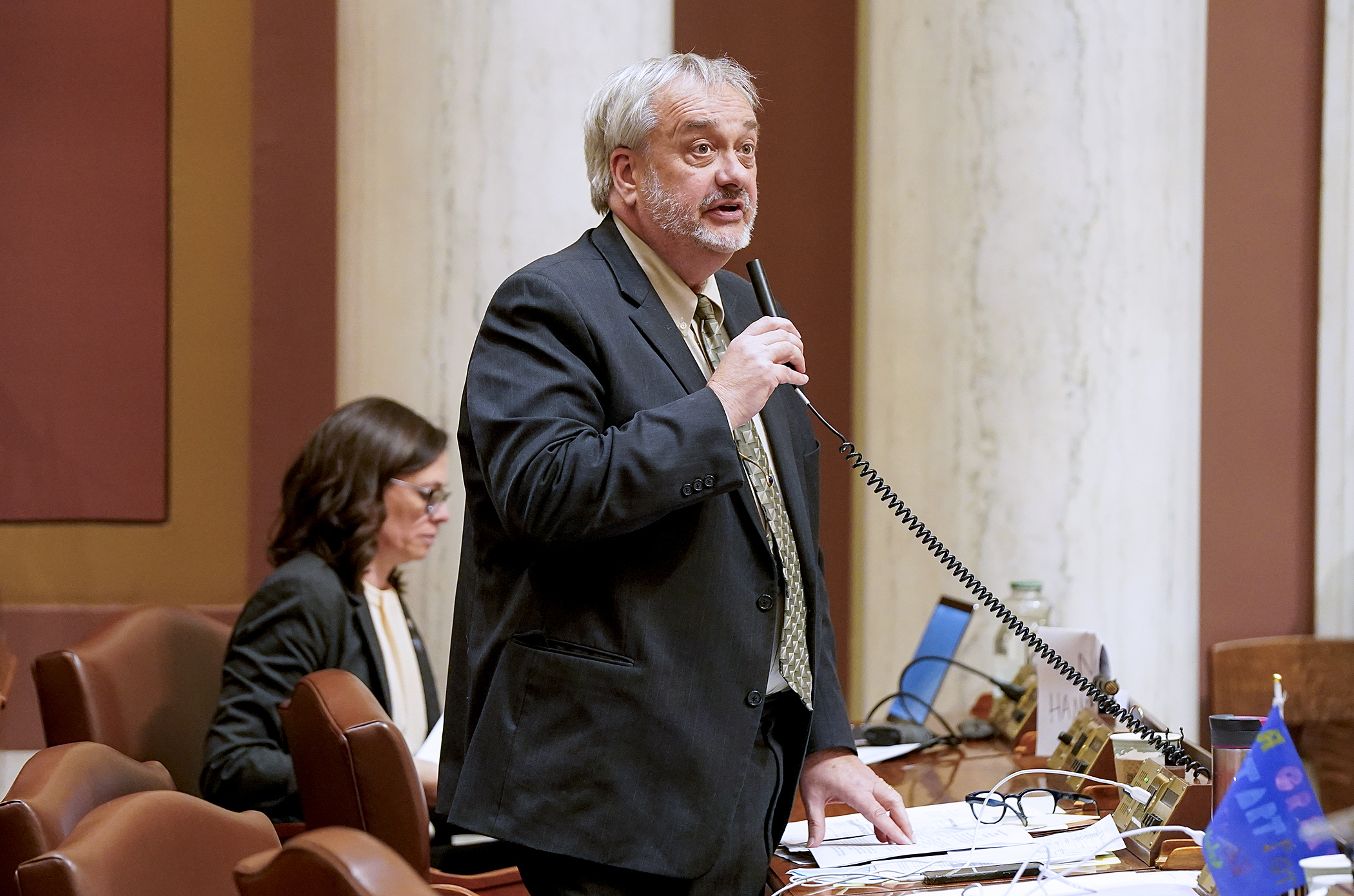Planting trees, measures to protect state’s helium resources included in environment package that clears House

More than once Rep. Rick Hansen (DFL-South St. Paul) has shared the adage that the best time to plant trees is 20 years ago. The next best time is today.
“It’s another great day to plant trees,” Hansen said Wednesday in introducing HF3911, the environment and natural resources supplemental policy and finance bill that would provide approximately $19 million from various funds to plant trees in communities, state parks, along trails and at the zoo.
The House passed the bill, as amended, 68-63 and sent it to the Senate.
Besides trees, Hansen offered another reason to support the bill: helium. Following discovery of a huge and valuable helium reserve in Northern Minnesota, lawmakers proposed setting a regulatory framework for exploration and extraction of the gas.
There are currently no regulations surrounding the extraction of helium, allowing production without consequences, Hansen said. The bill would put a moratorium on extraction while regulators work out the details to protect the state’s resources. That work could be the most important thing the Legislature does this year, Hansen told the House Ways and Means Committee when the bill was heard there.
Rep. Josh Heintzeman (R-Nisswa) said clean water, clean air, and an improved regulatory process are shared values.
“I think where we have disagreements is how do we get from Point A to completion,” he said, adding he might prefer a little more carrot and a little less stick.
Appropriations
The bill would appropriate $17.5 million from the General Fund including:
- $8 million to the Metropolitan Council for community tree grants;
- $6.8 million to help cover legal costs at the Pollution Control Agency and Department of Natural Resources;
- $1.2 million to the Board of Water and Soil Resources for its Lawn to Legumes program which encourages expansion of pollinator habitat; and
- via an amendment successfully offered by Rep. Ben Davis (R-Merrifield) $200,000 to reimbuse local law enforcement agencies for search and rescue operations related to recreational activities on unsafe ice.
[MORE: View the spreadsheet]
Waste reduction
Provisions of a so-called Packaging Waste and Cost Reduction Act are included in the bill.
Spearheaded by Rep. Sydney Jordan (DFL-Mpls), the goal is to shift responsibility of packaging waste, which makes up 40% of the waste stream, from consumers to producers. By 2032, with a few exceptions, all packing and paper products would have to be compostable, recyclable or collected under an approved stewardship plan.
Another provision would require the Pollution Control Agency develop a boat wrap stewardship plan aimed at preventing tons of plastic from ending up in landfills or incinerators.
While seeing merit in the ideas, Rep. Roger Skraba (R-Ely) thinks they should start with pilot programs instead of a statewide rollout.
The bill also includes scores of policy provisions affecting air, land, water and wildlife.
Ag-related provisions
Several Republicans oppose the bill because of its possible impact on agriculture, noting increases in agriculture-related penalties and additional regulation of livestock operations of more than 10,000 animals.
Rep. Steven Jacob (R-Altura) unsuccessfully offered an amendment to delete provisions that would prohibit planting corn on state land.
Those provisions would end a decades-old program where farmers grow crops on state land leaving some for wildlife. “This was a good program for the farmers, for the hunters and most of all it’s good for the wildlife,” he said.
Jacob said the bill in general penalizes hardworking Minnesotans and discourages businesses from locating here.
He also took issue with the bill’s spending. “At the end of the day this bill pits the DNR against farmers, pits small farmers against big farmers, and pits neighbor against neighbor.”
Related Articles
Search Session Daily
Advanced Search OptionsPriority Dailies
Ways and Means Committee OKs House budget resolution
By Mike Cook Total net General Fund expenditures in the 2026-27 biennium will not exceed a hair less than $66.62 billion.
That is the budget resolution approved Tuesday by the House Ways...
Total net General Fund expenditures in the 2026-27 biennium will not exceed a hair less than $66.62 billion.
That is the budget resolution approved Tuesday by the House Ways...
Minnesota's budget outlook worsens in both near, long term
By Rob Hubbard It looks as if those calling for less state spending could get their wish, judging from Thursday’s release of the February 2025 Budget and Economic Forecast.
A state su...
It looks as if those calling for less state spending could get their wish, judging from Thursday’s release of the February 2025 Budget and Economic Forecast.
A state su...